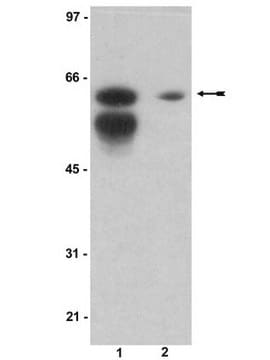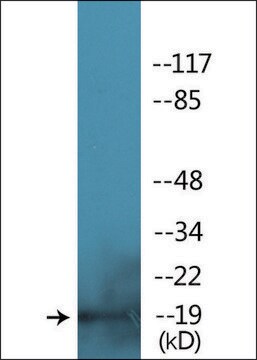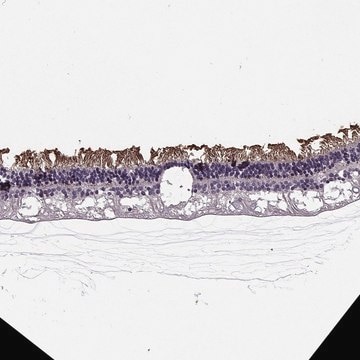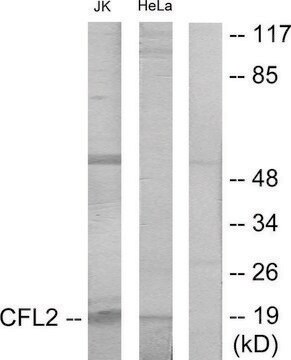07-415-I
Anti-Sam 68 Antibody
serum, from rabbit
Synonym(s):
KH domain-containing, RNA-binding, signal transduction-associated protein 1, GAP-associated tyrosine phosphoprotein p62, Src-associated in mitosis 68 kDa protein, Sam68, p21 Ras GTPase-activating protein-associated p62, p68
About This Item
IHC
IP
WB
immunohistochemistry: suitable
immunoprecipitation (IP): suitable
western blot: suitable
Recommended Products
biological source
rabbit
Quality Level
antibody form
serum
antibody product type
primary antibodies
clone
polyclonal
species reactivity
human, mouse
species reactivity (predicted by homology)
rat (based on 100% sequence homology)
technique(s)
immunocytochemistry: suitable
immunohistochemistry: suitable
immunoprecipitation (IP): suitable
western blot: suitable
NCBI accession no.
UniProt accession no.
shipped in
wet ice
target post-translational modification
unmodified
Gene Information
human ... KHDRBS1(10657)
mouse ... Khdrbs1(20218)
rat ... Khdrbs1(117268)
General description
Specificity
Immunogen
Application
Signaling
Signaling Neuroscience
Immunohistochemistry Analysis: A 1:600 dilution from a representative lot detected Sam 68 in mouse colon tissue (Data courtesy of Stephane Richard, McGill University).
Western Blotting Analysis: A representative lot detected Sam 68 in endogenous Sam 68 and exogenously expressed GFP-Sam 68 fusion in HeLa cells (Chen, T., et al. (1999). Mol Biol Cell. 10(9):3015-3033).
Western Blotting Analysis: A representative lot detected Sam 68 in HEK293 transfected with GFP-Sam68, mouse cortex, hippocampus, cerebellum, and mouse brain (Iijima, T., et al. (2011). Cell. 147(7):1601-1614).
Western Blotting Analysis: A representative lot detected Sam 68 in HeLa cells transfected with GFP-Sam68, MDA-MB-231, MDA-MB-468, and BT20 (Lukong, K.E., et al. (2005). J Biol Chem. 280(46):38639-38647).
Western Blotting Analysis: A representative lot detected Sam 68 in lysates from isolated mouse cells and mouse embryonic cell (Richard, S., et al. (2005). PLoS Genet. 1(6):e47).
Immunohistochemistry Analysis: A representative lot detected Sam 68 in mouse cerebellum, parasagittal section of brain stem and cerebellum (Iijima, T., et al. (2011). Cell. 147(7):1601-1614).
Immunohistochemistry Analysis: A representative lot detected Sam 68 in embryonic mice (Richard, S., et al. (2005). PLoS Genet. 1(6):e47).
Immunocytochemistry Analysis: A representative lot detected Sam 68 in HeLa cells (Chen, T., et al. (1999). Mol Biol Cell. 10(9):3015-3033).
Immunoprecipitation Analysis: A representative lot immunoprecipitated Sam 68 in HeLa, HeLa cells transfected with GFP-Sam68, and MDA-MB-468 (Lukong, K.E., et al. (2005). J Biol Chem. 280(46):38639-38647).
Quality
Western Blotting Analysis: A 1:500 dilution of this antibody detected Sam68 in 10 µg of MDA-MB-468 cell lysate.
Target description
Linkage
Physical form
Storage and Stability
Handling Recommendations: Upon receipt and prior to removing the cap, centrifuge the vial and gently mix the solution. Aliquot into microcentrifuge tubes and store at -20°C. Avoid repeated freeze/thaw cycles, which may damage IgG and affect product performance.
Other Notes
Disclaimer
Not finding the right product?
Try our Product Selector Tool.
Storage Class Code
10 - Combustible liquids
WGK
WGK 1
Certificates of Analysis (COA)
Search for Certificates of Analysis (COA) by entering the products Lot/Batch Number. Lot and Batch Numbers can be found on a product’s label following the words ‘Lot’ or ‘Batch’.
Already Own This Product?
Find documentation for the products that you have recently purchased in the Document Library.
Our team of scientists has experience in all areas of research including Life Science, Material Science, Chemical Synthesis, Chromatography, Analytical and many others.
Contact Technical Service








